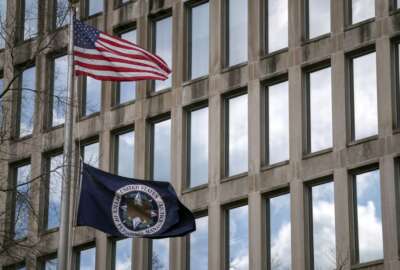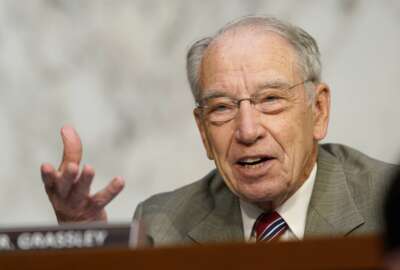Hubbard Radio Washington DC, LLC. All rights reserved. This website is not intended for users located within the European Economic Area.
Borras leaves DHS more integrated, on better financial path
Rafael Borras spent the last four years as the undersecretary of management for the Homeland Security Department before leaving Feb. 7. He said his goal was to ...
wfedstaff | April 17, 2015 6:16 pm
The Homeland Security Department launched version one of the Management Cube earlier this month.
For the first time in the agency’s 11-year history, officials can understand the interactions between data.
“Because it has been built in an integrated fashion, now you have the ability to layer information,” said Rafael Borras, the undersecretary for management at the Homeland Security Department for the last four years, who recently left DHS to return to the private sector, in an exclusive interview with Federal News Radio. “So for example, if DHS is looking at a facility in Dallas, Texas, it’s not that hard to know how many people are assigned to that facility. But that’s not enough. It doesn’t tell me anything about what’s happening at that location. The system can now not only query how many people are assigned to this location, [but by] looking at our security data, we know how many people swipe in and swipe out. So now we also know how well or not the facility is being utilized.”
Borras said three or four years ago, DHS would only know how many people were assigned to the facility and base their square-footage needs on that total number.
But the Management Cube opens the aperture across several different data layers.
“Now you start bringing this information together, and you see how many people are using IT systems, so you have the IT data. The security data tells you how many people are coming in and out. You look at the HR data and how many people are assigned there, you might find — and I’m just making this number up as an example — out of the 1,000 people, only 200 are coming in every day,” he said. “That allows you to begin to drive some real-estate decisions about how to readjust or realign that footprint.”
Vision from the beginning
This simple example highlights just how far DHS has come over Borras’ four years as undersecretary for management.
From the beginning, Borras said his goal was to make DHS more business-like in how it uses data to make decisions. During his confirmation preparation before the Senate, he said he wrote a management paper detailing focus areas, including improving the agency’s decision making capabilities.
“There was a time at DHS when, as you know we have 13 different financial systems, it took sometimes 90 days plus just to do a data call within the various components to get information back to help decision making, whether it was to respond to Congress, respond to the Office of Management and Budget or respond to the secretary,” he said. “What we were trying to do is shorten that time.”
Borras kicked off two complementary tracks to begin fixing the data and systems problems.
One track created this Management Cube by bringing some standards to how the agency constructs and maintains databases.
The second track focused on financial management and moving the department toward a clean financial audit. DHS finally achieved a clean audit in fiscal 2013 after a decade of not being able to close its financial books.
Borras credited the senior officials leading the financial, technology, acquisition, human resources and program offices for accomplishing the clean audit and management cube.
But it takes a vision and support from the top to push through the barriers and keep the agency on track to meet its goals, and that’s the role Borras played.
“I had this vision in mind, but it was all integrated. It was not just a data analytics system, but a behavior system, if you will. I wanted to force the integration of all six lines of businesses. So, they are all layered, all of these strategies, and built upon each other,” he said. “So, first was the very sort of culture effort to be able to get the lines of businesses to find their interdependencies and to work closer together and mutually. That made the decision to build the cube on a single platform. That was much easier because we had already begun to force that integration by bringing the chiefs closer together.”
No new money for the Cube
Part of the reason the cube idea worked was as much about timing as Borras’ ability to force the integration.
He said everyone understood the common sense, practical nature of building a platform that made data integration easier.
“We never asked Congress for more money to build a Management Cube. We’ve been finding internal efficiencies. I think this is the real key, reprioritizing our investments,” Borras said. “So typically what you find in a lot of organizations, if someone wants to do something new, the first thing you say is you go to OMB or Congress and say ‘I need some more money to do X.’ Our approach was different. We said, ‘if X is that important, we will find things we don’t want to do and reallocate that money,’ with OMB’s knowledge and approval and the Hill being aware of it as well. I think that gained us a lot of credibility with both OMB and the Hill when they saw how committed we were to it that we were able to reprioritize our spending and put it behind the development of these tools.”
He took a similar approach to achieving the clean audit status.
Borras said it wasn’t just the CFOs or budget office’s focus area. Technology, acquisition, facilities and many others played important parts.
“What this activity showed is, we could behave like OneDHS because every piece of DHS, whether it was the Coast Guard, whether it was the Immigration and Customs Enforcement or whether it was FEMA, had to be involved in this very aggressive and very complex coordinated event to be able to get our financial books in order, because it dealt with property, it dealt with internal controls, it dealt with payments, all the issues you’d expect,” he said. “What specifically did I do to do that? The most important thing I always say is, I believe in my people. Around the clean audit, I became the chief belief officer. No small role. It was very important to go out and remind people the capabilities that they had, how close we were and to demonstrate what it would take to be able to reach that goal.”
Shared services on the horizon
Borras said he also had support from the top with former Secretary Janet Napolitano and Deputy Secretary Jane Holl Lute, especially during departmental component head meetings when Napolitano would ask him if any components were not cooperating or putting in the effort to achieve the clean audit.
“It was never about shaming anybody. It was a tremendous opportunity for me to be able to report in front of the secretary and all the component heads the cooperation I was getting from the commandant and vice commandant of the Coast Guard, for example,” he said. “Making it a positive was very good for the organization.”
Borras said getting a clean audit is one accomplishment, but it will take more focus and even a bigger effort to maintain and continue to improve upon the significant weaknesses that still exist in DHS’ internal financial controls.
Along with a clean audit, DHS has been trying for some time to consolidate those 13 financial management systems.
Borras said the agency is well on its way toward having fewer systems, but not one big one.
He said the Coast Guard and several smaller components are expected to migrate over the next year or two to a federal shared service provider outside of DHS.
Meanwhile, the Customs and Border Protection directorate will host other DHS components.
“What we are doing in re-knitting the organization together, both inside and outside with shared service providers, rather than building one mega system that would be so costly, so expensive, so time consuming and very risky,” he said.
Borras said he’s unsure what he will do next, but knew after spending three months as the acting deputy secretary and seeing how well the organization ran without him, it was time to move on.
“What I wanted to do is take a little time to decompress from a very intense and rewarding four years and consider what I want to do. I just want to do it on my time,” he said.
RELATED STORIES:
DHS unleashing data analysis to improve investments
DHS management chief Borras to return to private sector
DHS issues first ever clean financial audit, but IG says more work needed
Planning, performance measures puts DHS on solid financial footing
Copyright © 2024 Federal News Network. All rights reserved. This website is not intended for users located within the European Economic Area.
Jason Miller
Jason Miller is executive editor of Federal News Network and directs news coverage on the people, policy and programs of the federal government.
Follow @jmillerWFED





